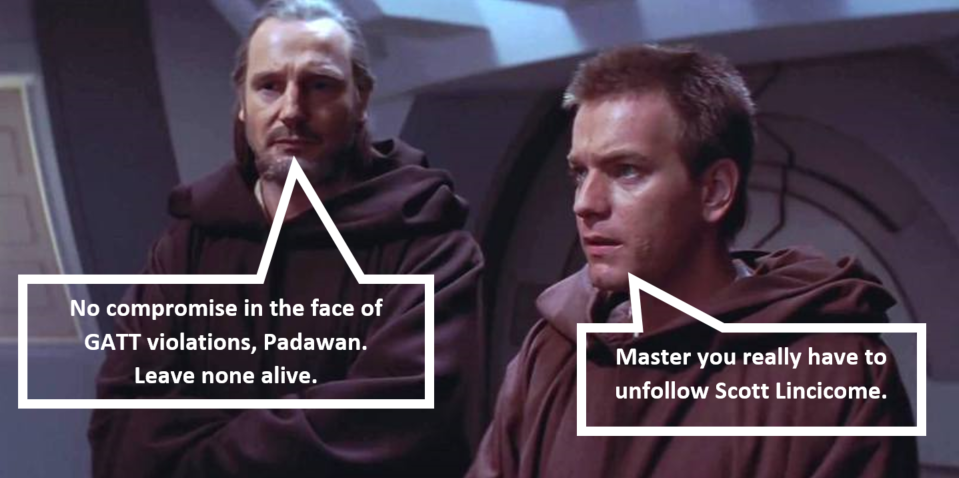What's the Fudge?
This is a post in the ongoing series: "Trade Negotiations, How do they work?" where I provide a glimpse into the inner workings of trade policy negotiations.
In this post I'll be talking about a critical but often maligned concept, that of ‘fudge’. Fudge is non-binding or vague language which fills the gaps between the solid blocks of more definite commitments.
Disclaimer: This post focuses on the tactics of negotiations. It's an inherently subjective area. Please consider these the musings of one person with one set of experiences and not a definitive or exhaustive guide.
The closer to a deadline a negotiation gets, the more you’ll hear trade commentators talk about fudge. This may come as a surprise, and not only because it’s hard to believe ‘trade commentator’ is an actual thing an adult can be.
In the trade world, ‘fudge’ refers to language in an agreement which is deliberately non-binding and lacking in legal certainty. It occurs most often when consensus on a stronger or more certain commitment is either impossible to draft or impossible to agree but the issue in question is too important to drop.
Negotiators tend to use ‘fudge’ as a pejorative, while privately accepting that there are times when it can be useful. So basically, the same way the general public uses ‘negotiators.’
Bad news: I weep inside.
Good news: I figured out how to upload gifs you guys!
Why the fudge?
Most trade negotiators find fudge slightly distasteful, because it represents a failure to agree a binding commitment and could create legal ambiguity down the line. Still, there are a few scenarios where they overcome the bile in their throats to dribble fudge all over a proposed text.
Scenario 1: We don’t always get what we want.
One party in a negotiation wants a binding commitment. Another cannot or will not provide it. The impasse is preventing an outcome and political pressure is growing. They agree on fudge.
In this scenario, the party that wanted a binding commitment is making a significant concession by accepting something far weaker. The fudge they receive instead provides them some political cover, in allowing them to claim an outcome on the issue (if not the one they wanted). It’s like asking Liam Hemsworth out to dinner, and settling for brunch with Luke.
Ugh. I mean. Fine… but only because I love brunch.
Scenario 2: There ain’t no words
Not all issues readily lend themselves to the kind of binding legal commitments or trade rules negotiators love, but some are still considered sufficiently trade relevant for inclusion in an agreement.
Women’s economic empowerment is a good recent example. Even parties like the EU and Canada which are strongly committed to the issue have struggled to arrive at many binding commitments in the gender chapters of their FTA.
Another example is in services market access, where in some fields the regulations for participation in a market are set by a private body the government doesn’t control, such as when the ability to represent someone in court required certification by a Bar Association. In an area like this, a government may not be able to make binding commitments without upending the way its entire legal system operates.
Confusingly, this gentleman also applies privately set standards to prevent my entrance into a bar.
In these scenarios, fudge can offer a way for governments to come as close to a commitment as they can.
Scenario 3: Problems for another day
Many modern trade agreements leave a whole range of issues incomplete, on the assumption of future work. This is either a face saving exercise or a sensible decision to leave some issues which may be technically complex but uncontroversial or which are still emerging, for later talks.
Fudge flavors
Looking through hundreds of fudge pictures left me feeling hungry and guilty about my diet, so here are some carrots.
There are many different types of fudge in the larders of trade negotiators, ranging in texture from the crunchy (most specific and legally certain) to the gooey (vaguest and about as legally sound as a last will and testament made out to ‘cash’). I present some of the more common ones in descending order of crunch.
Best Endeavor
Jedi Master and world’s deadliest muppet Yoda famously warbled, “Do… or do not. There is no try.” He would have made a terrible trade negotiator. In fact, it was probably under his tutelage that Obi-Wan and Qui-Gon managed to escalate a local tariff conflict into a galaxy spanning shooting war within the first 3 minutes of Episode I.
Protectionism leads to anger. Anger leads to tweeting. Tweeting leads to the Cato Side.
In a trade negotiation, sometimes ‘try’ is the best you can get. You want a binding commitment on something, and the other government is unwilling or unable to make it in a legally binding fashion. With time running out, or perhaps in exchange for some other concession, you might agree to switch the text to a ‘best endeavor’ clause.
This can be as simply as replacing or qualifying a few of the key verbs in the paragraph and changing the commitment from doing something, to trying to do it. This keeps the flavor of the commitment largely intact, but makes it far more difficult to prove it has been breached.
Accepting best endeavor language on something you were seeking a binding commitment on is a considerable concession, requiring either a great deal of trust in the long term good faith of the other party, a juicy trade-off, or a great deal of political pressure to make a deal.
Future Work Mandate (and Framework)
Sometimes instead of a new trade rule, an agreement instead includes a provision mandating future negotiations on the subject in question. These provisions can even establish requirements for regular meetings between the parties to advance such talks.
When used in good faith, mandates and frameworks can be useful tools to ensure a constructive ongoing dialogue to tackle outstanding issues or new trade challenges as they arise.
When used in bad faith, they are a way of committing to ‘talking’ but not to actually ‘doing.’
Deliberately Ambiguous
Toward the gooier end of the scale, deliberately ambiguous provisions are written to achieve an ‘outcome’ on something without actually committing the other side to anything concrete.
Again, much here depends on the level of trust and goodwill in a negotiation. If both sides are approaching the talks in the right spirit, then not haggling over the exact location and font size in which a country’s stamp duties will be listed on their website is just common sense.
However, the less confidence partners have in each other the more they will read subterfuge and deception into pushes for ambiguous language.
Recognizing Importance
The gooiest of all possible fudges, this is to securing a trade commitment what posting “Goals” on a fitness model’s Instagram is to getting fit.
I also retweeted this photo so I’m basically an elite athlete now.
Here, the parties simply restate for the record that each recognizes the importance of a concept, ideal or principle. This could be anything, from liberalization to labor rights or achieving sustainable development.
While on very rare occasions achieving this kind of thing can be seen as a symbolic political victory, in the overwhelming majority of cases it is seen as a colossal fudge representing the impossibility of securing anything of any meaning on the issue in question.
Fudge the legal team
Fudge flies in the face of trade’s linguistic guardians, the lawyers.
The role of trade lawyers during a trade negotiation is to be infuriating. Almost all trade agreements are fundamentally about governments agreeing to limit some of their future options when it comes to interfering in trade. Given the weight of such commitments, precise legal wording is critical.
Trade lawyers scrutinize every letter in a draft agreement to find potential unintended meanings or loopholes. They chant the mantra ‘legal certainty’ to send their negotiator colleagues back into battle again and again to hammer out yet more explanatory footnotes. There are few trade negotiators who cannot recall screaming incoherently upon hearing, “Yes, but couldn’t this be read to say…”
By definition, fudge can’t meet any of these tests. It is specifically designed to offer no legal certainty and to be read in a number of different ways depending on the audience. It’s a Rorschach test, except for trade commitments instead of my father’s disappointment.
The only Rorschach Test that matters is how he kills you.
Fudgeclusion
So, is fudge good or bad? In the true spirit of this blog, I am going to fudge the answer to that and say ‘it depends.’
On the one hand, fudge has provided political cover and elegant solutions to some intractable negotiation problems while in many cases achieving the exact same practical outcome as unacceptable binding language.
On the other, fudge massively bloats up trade agreements, creates mountains of needless ambiguity and can cause genuine resentment between parties when it later emerges one side considered the language to be far gooier than the other.
My advice is to know when to use it, be clear of its limitations and wherever possible ensure at the highest level possible that there is a shared understanding of what a given piece of fudged language will mean in practice.
Happy fudging, trade-pals.
I hope you have enjoyed this post in the negotiation tactics part of the "Trade Negotiations, How do they work?" series. As always I remind you this is just one view on how to approach trade negotiations and you should treat it dubiously, like three week old fudge.
Other negotiators will have contradicting or complementary takes, and I would encourage you to read them, especially when angrily tweeted at me after posting this article.
As always, if you have any comments, suggestions or puns. feel free to leave them in the comments below or tweet em’ at me.







